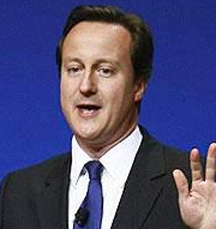LONDON, (Reuters) – Britain’s main political parties agreed to create a new system to regulate the news media on Monday, hoping to end an era when tabloid newspapers trawled through people’s mobile phone messages to dredge up salacious stories.
Public outrage over phone hacking, which went beyond celebrities to include victims of crime and abducted children, pushed the government to act, but it said it had done so in a way that still protected press freedom.
Under the compromise agreed by the three main parties and approved by parliament late on Monday, a new press regulator will be set up with the power to levy fines of up to 1 million pounds ($1.5 million) and to oblige newspapers to print prominent apologies where appropriate.
The system will be voluntary, but there will be strong financial incentives to encourage newspapers to opt into it.
“I have today reached cross-party agreement on a royal charter that will help deliver a new system of independent and robust press regulation in our country,” Prime Minister David Cameron told parliament.
“It is right we put in place a new system of press regulation to ensure that such appalling acts can never happen again.”
The government came under pressure to create a new regulatory system after The Guardian newspaper exposed phone hacking by tabloid papers. The hacking of a murdered schoolgirl’s phone led to a judge-led inquiry which laid bare the scale of the problem.

But concerns that a new system could imperil press freedom delayed agreement, with some press barons threatening to boycott a new regulatory regime and campaigners for tougher regulation accusing Cameron of being in thrall to the press.
Monday’s deal spares Cameron what was shaping up to be an embarrassing political defeat in parliament that would have deepened rifts in his coalition government.
The three parties had been divided over whether a new press regulator should be enshrined in law and over how its members would be chosen. But they reached a compromise after agreeing to enact legislation to ensure the new system could not be easily altered later.
VULNERABLE AND
INNOCENT
Cameron said he was satisfied with the outcome.
“It … ensures that for generations to come government ministers cannot interfere with this new system without explicit and extensive support from both houses (of parliament). That is an important step forward,” he told members of parliament.
“We stand here today with a cross-party agreement for a new system of press regulation. It supports our great traditions of investigative journalism and free speech. It protects the rights of the vulnerable and the innocent.”
Ed Miliband, the leader of the opposition Labour party, also said the compromise struck the right balance.
“The regulator will be independent of the press. This is a system that will endure,” he told parliament.
Others were less happy.
In a statement, some of the country’s biggest press groups testily said they were unable to give a response because they had been excluded from last-minute talks and needed time to study what had been agreed.
Noting that early drafts had contained “several deeply contentious issues which have not yet been resolved with the industry”, many of the newspapers ran articles that made it clear they were angry about the new regulatory regime and might consider boycotting it.
They drew encouragement from the official in charge of media freedom at the 57-nation Organization for Security and Cooperation in Europe (OSCE) who said the criminal activities of some journalists “should not be used as an excuse to rein in all print media”.
“A government-established regulatory body, regardless of how independent it is intended to be, could pose a threat to media freedom,” said Dunja Mijatovic at the Vienna-based OSCE.
Index on Censorship, a group that campaigns for free speech, also said it was a “sad day for press freedom in the UK”.
“The involvement of politicians undermines the fundamental principle that the press holds politicians to account,” said Kirsty Hughes, its CEO.
But Hacked Off, a group representing the victims of newspaper behaviour, welcomed the deal.
